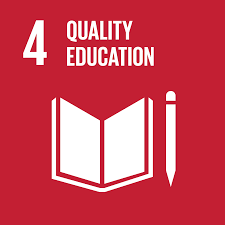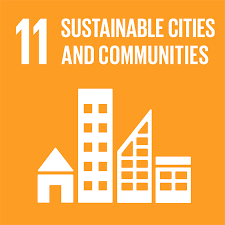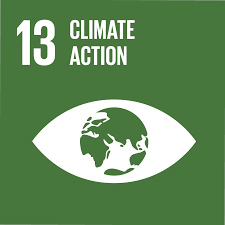Is Climate Education a Human Right?
- Sandeepa

- Jul 7, 2020
- 5 min read
This article is focused on these Sustainable Development Goals:

I know what you’re thinking: climate change and education? How could that possibly connect to the topic of human rights? The first one is quite straightforward: everyone has the right to education, despite your socioeconomic status, age, gender, or ethnicity. However through the lens of climate change, part of the positive progress to achieving the Sustainable Development Goal 13 is the importance of engagement through decision-making processes. Therefore, ensuring quality education through personal engagement with issues concerning climate change will help us build a sustainable future for our communities.
A project that the Green Lions, an environmentally-driven club at my school, was going to partake in was designing and building a garden for elementary school children. Due to our current circumstances, we had to halt the process. My point is that this is something that we could all engage in, not specifically through this perspective, but using other ways too. Another lens one could look at is teaching local children in your community about prominent global challenges. This could be through the lens of economics, business or simply, our environment. Thus, this is a great opportunity for you to help students in your community by educating them about relevant issues in our world today.
Concerning our current situation with COVID-19, you could also initiate online sessions with younger students to teach them about the importance of climate justice and advocacy. There is a wide range of options to suit your scenario but the gist of this is to take advantage of what you know. Use this opportunity to share your knowledge and impact the people around you.
Children who don’t have equal access to quality education benefit from this solution in various manners. Firstly, we achieve equity by educating students at local schools, which tend to be the most vulnerable in our communities. Secondly, by initiating an education program (for example), you are encouraging engagement to overcome the inequalities which are present in your community. Let’s say you wanted to start a community garden program, as encouraged above, this would have the same implications. Even better, you would be impacting all members in your diverse community, from toddlers to teenagers to adults!
This brings us to participation: the importance of providing low-income communities with education works towards aiding them in the acceleration of their learning. Teaching students curriculum-based subjects is valuable however, educating your community in any manner about the significance of climate change is globally prevalent, and necessary. Furthermore, we can find ways to increase participation within the groups through projects and hand-in-hand activities. This is crucial as we can find ways to increase and incorporate the number of vocational skills taught to the children in your community. By doing so, we can teach the children relevant skills for the future.
We are all aware that education is a human right, so why is it that 103 million youth worldwide lack basic literacy skills? The underlying inequalities in our societies today have created barriers for children to have the ability to learn valuable skills for their future, especially the most vulnerable. In Ghana, education isn’t the only problem, there is a lack of infrastructure and security. Around the world, other issues that arise are gender inequality and political violence. In connection to SDG 4: Quality Education, we can all find ways to help the children in our local community by educating them about relevant global issues. By doing so, they learn about the world they live in and gain insight into the global challenges and current events. Furthermore, we are sharing our privilege with them so they can become global citizens too. The right to education shouldn’t vary according to a circumstance or gender however, at the moment, it is the harsh reality we face. So, let’s take matters into our own hands. Not only can we work together to promote the need to educate low-income children basic literacy and numeracy skills, but we can also work together in teaching children the importance of sustainable development in their countries.

A community helper in Ecuador.
This brings me to SDG 13: Climate Action. We can help educate children in our community about climate change in various manners. One of the proposed solutions to building a community garden is a great way to promote climate action through education. Not only are children and community members learning about the process, but they are also personally engaging themselves too. By doing so, they understand the impacts of climate change in their environment through hands-on activities and they are educated about sustainability. Not only are community gardens a great initiative to build on the education of sustainable development, but it also serves as the means for families to rely on the products of their engagement. In Imbabura, Ecuador, community gardens integrate a variety of workshops and courses about nutrition and food hygiene. According to the SDG Fund, more than 700 families have improved their daily habits by switching to a more healthy and varied diet. Furthermore, these diets have helped the citizens contribute to the development and prosperity of their region in Ecuador (Community Gardens).
"I often say that each of us have talents. Mine is for sowing seeds. I have come to appreciate this talent and use it as much as I can to help my friends. My idea is to focus on different types of products and to continue to cultivate them. The community gardens have brought us, the residents of Imbabura, both hope and sustainable development." says Virginia Morales, beneficiary of the program.
As mentioned before, the youth are the change-makers and hence, educating them about the impacts of climate change and the significance of sustainable development can help us build a resilient future. In connection to SDG 11: Sustainable Cities and Communities, by educating children about sustainability, we build a future of youth who understand the importance of being a change-maker in our society today. Part of this future-building consists of the exchange of knowledge throughout contributors to learn and apply as much knowledge to protect their environment. For us to create a sustainable future for our youth, we need to start with our environment and the people in our communities; then only can we continue to implement sustainable practices within and outside our community.
Start with your community and create a network of students who are educated about global issues such as climate change around your city. Remember, not only is education a right but being a part of the decision-making process concerning our environment is a right we all hold as citizens of a country. The youth is the future tomorrow so let us help build that future. Remember, change starts with you.
External Resources
Click here to learn about how you can create a community garden.
Click here to learn more about Ecuador’s Community Gardens.
Find out more about Italy’s implementation of Climate Change and Sustainability Education here.
Bibliography
“Community Gardens Improve Nutrition for 700 Families in Imbabura.” Sustainable Development Goals Fund, 2 Feb. 2018, www.sdgfund.org/community-gardens-improve-nutrition-700-families-imbabura.
“Goal 11: Sustainable Cities and Communities.” UNDP, www.undp.org/content/undp/en/home/sustainable-development-goals/goal-11-sustainable-cities-and-communities.html.
“Goal 13: Climate Action.” UNDP, www.undp.org/content/undp/en/home/sustainable-development-goals/goal-13-climate-action.html.
“Goal 4: Quality Education.” UNDP, www.undp.org/content/undp/en/home/sustainable-development-goals/goal-4-quality-education.html.
“Quick Guide to Education Indicators for SDG 4.” UNESCO Department of Statistics, UNESCO-UIS, 2018, www.undp.org/content/undp/en/home/sustainable-development-goals/goal-11-sustainable-cities-and-communities.html.






Comments